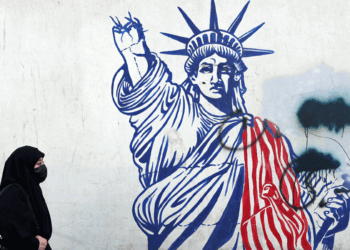Major tech companies are distancing themselves from the Southern Poverty Law Center, a leftist group that demonizes conservatives and Christians, after facing pressure over previous relationships with the SPLC in the wake of Charlie Kirk’s assassination.
Kirk’s alleged murderer said he killed the Turning Point USA founder because he “spreads too much hate.” The assassination took place two months after the SPLC put Turning Point USA on a “hate map” with chapters of the Ku Klux Klan—a “hate map” that had inspired a terrorist attack in 2012. The SPLC condemned the assassination, but kept Turning Point on the map.
Earlier this month, shareholders filed proposals at major companies, urging them to investigate whether the companies have used politicized tools like the SPLC’s “hate map.” Conservative groups also sent a letter to Benevity, which connects nonprofits to major corporations, urging it to stop using the SPLC “hate map.”
Many of the companies told The Daily Signal that they do not have relationships with the SPLC any longer and do not use the “hate map.”
The Heritage Foundation filed seven shareholder proposals with companies including Alphabet, Mastercard, Meta, PayPal, and Salesforce.
“The Southern Poverty Law Center has designated October as Hate Crimes Awareness Month—but few organizations have sown more hatred against fellow Americans than the SPLC itself,” Heritage Chief Advancement Officer Andrew Olivastro previously told The Daily Signal. “It doesn’t fight hate—it manufactures it, embedding division into every press release they issue and every word they post; their business model is defamation, and America is finally waking up.”
Eleven conservative groups on the “hate map” sent the letter to Benevity.
“The SPLC’s claim to be a civil rights organization cannot be taken seriously,” the signatories wrote. “Instead, it is a political weapon that targets mainstream libertarian, conservative, religious, and family advocacy organizations for ideological reasons.”
The signatories claim the SPLC attacks organizations “not because of violence or extremism, but because they dissent from the SPLC’s preferred progressive orthodoxy.”
Alphabet
Alphabet, the parent company of Google and YouTube, has faced criticism for including the SPLC in YouTube’s “Priority Flagger” program, which helps police YouTube for extremist content, and for the SPLC’s prominent place in Google search results for key conservative figures.
Google and YouTube distanced themselves from the SPLC.
“We don’t and have never used SPLC’s hate map for any reason, including for content moderation,” a YouTube spokesperson told The Daily Signal in a statement Tuesday.
“On the YouTube side, I can confirm that the Southern Poverty Law Center is not part of our priority flagger program and has not been for at least three years,” Nicole Bell, YouTube’s head of reputation and responsibility communications, told The Daily Signal.
Google spokesman Ned Adriance told The Daily Signal that the SPLC’s website “does not receive preferential treatment in Search and its ranking is determined by the same algorithmic factors as any other site.” He clarified that the search “ranking is based on a number of algorithmic factors, like links to a page from other sites, freshness, and user interactions.”
Benevity
According to its website, Benevity connects “nearly 1,000 enterprise companies” to a network of 513,000 nonprofits after vetting 2.2 million of them. It says it has managed $16 billion in grants and 99 million employee volunteer hours. In 2023, more than 2.3 million people donated through the Benevity platform, representing $3.2 billion.
1792 Exchange, a nonprofit that exposes bias in corporate businesses, has counted 224 of the Fortune 1,000 companies that use Benevity. The list includes Amazon, Apple, Best Buy, Coca Cola, Costco, Lowe’s, Macy’s, McDonald’s, Microsoft, Netflix, Paramount, and UPS.
In 2021, then-Benevity CEO Kelly Schmitt delivered a PowerPoint presentation explicitly stating that the company had “vetted” almost “2 million nonprofits,” adding that it used the “Southern Poverty Law Center Hate List.”
The conservative nonprofits’ letter notes that “there are also recent reports of employees from major corporations that Benevity’s system blocked them from donating to Turning Point USA because of the SPLC’s designation.
Benevity said it hasn’t relied on the SPLC “hate map.”
“Benevity has never relied on the SPLC hate map to determine whether nonprofits are eligible for the platform,” the spokesperson told The Daily Signal. “The nonprofits included on the current SPLC hate map are eligible for Benevity as long as they are in good standing with the IRS and in compliance with our terms of use. Some nonprofits may not be eligible for a specific client’s program if a client has chosen to exclude them as part of their program guidelines or for any other reason.”
“Benevity’s former CEO herself bragged about using Southern Poverty Law Center to vet charities. Today’s anonymous denial is not credible,” Greg Scott, executive vice president of 1792 Exchange, told The Daily Signal in response to Benevity’s denial.
Mastercard
The SPLC condemns the David Horowitz Freedom Center, which warns about the threat of radical Islamist terrorism, as an “anti-Muslim hate group.” In congressional testimony, the SPLC bragged that the center’s eponymous founder said, “The reason Mastercard and Visa gave us for cutting us off and thus sabotaging our online fund-raising operation is that the SPLC told them that we were a hate group.”
Mastercard denied this claim.
“We are regularly made aware of merchants and websites that may have illegal content or incite violence,” Seth Eisen, Mastercard’s senior vice president for communications, told The Daily Signal. “As part of our normal process, we share this information with the acquirer—or merchant’s bank—who connects the website to our network to accept card payments.”
“The acquirer would then review the site to determine if there is compliance with legal requirements and our standards,” Eisen added. “The acquirer would then determine what action to take. In this case, the acquirer advised us that they decided to terminate card acceptance on the site.”
Facebook, whose parent company is Meta, consulted with the SPLC in policing the platform for “hate speech” and “hate groups,” according to a Daily Caller report from 2018. The SPLC appeared on a list of “external experts and organizations” that Facebook works with “to inform our hate speech policies.”
The company said it no longer works with the SPLC, however.
“Meta does not work with the SPLC and has never relied on its ‘hate map’ when creating our policies,” a spokesman told The Daily Signal in a statement Wednesday.
Meta has altered its policies in recent years, to the SPLC’s consternation.
As far back as 2019, Meta clarified that it did not accept the SPLC’s claim that certain conservative organizations are “hate groups.”
Charlie Kirk praised Meta’s January policy changes after meeting with the company’s CEO, Mark Zuckerberg.
“Mark Zuckerberg announced sweeping policy changes, saying they’re getting rid of their fact checking department, that this election was about more speech, not less speech,” Kirk said. He praised Zuckerberg as “very sincere,” and praised Facebook’s willingness to “stand up to these regimes and say, ‘No, we are going to protect freedom of speech.’”
The SPLC attacked Meta’s policy changes, warning that they could “encourage hate and threaten democracy.”
PayPal
PayPal’s then-CEO Dan Schulman mentioned the SPLC when The Wall Street Journal asked him in 2019 “what outside groups are most helpful in terms of informing PayPal’s decisions on users or websites that may be violating the company’s policies?”
“PayPal does not rely on the Southern Poverty Law Center when making assessments about activity on our platform,” a spokesperson told The Daily Signal in a statement Wednesday.
Salesforce
In a 2022 blog post, Salesforce stated that it uses the SPLC list “to identify hate groups and keep hateful material off our platform.” That same year, Fox News reported that Salesforce’s Slack had banned the Federation on American Immigration Reform, which the SPLC calls an “anti-immigrant hate group” from the platform.
A Salesforce spokesperson said the company does not solely rely on the SPLC “hate map.”
“All customers are bound by our acceptable use policies, which govern how our products and services may be used,” the spokesperson told The Daily Signal. “We don’t rely on the SPLC list or any single external source when making [Acceptable Use Policies] decisions. When we receive reports of potential violations, our internal teams review them for [Acceptable Use Policies] compliance, focusing on policy adherence rather than ideology.”
Next Steps on SPLC
“It is instructive that Benevity and multiple corporations are distancing themselves from SPLC,” Scott, the 1792 Exchange leader, told The Daily Signal. “Now it’s time for those companies to move from sheepish denial to substantive change by officially ending their relationships with SPLC and stop excluding charities based on noxious slander by this discredited organization.”
The SPLC did not respond to The Daily Signal’s request for comment by publication time. Amazon, Starbucks, and Texas Instruments did not respond to The Daily Signal’s request, either.








